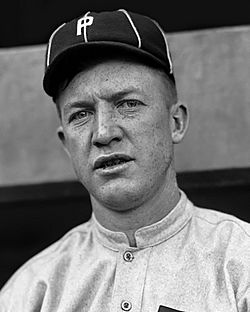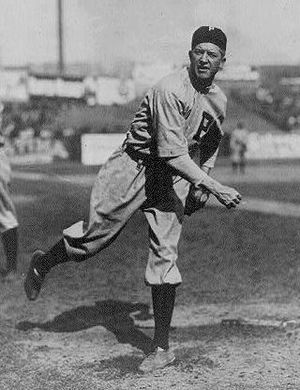Grover Cleveland Alexander facts for kids
Quick facts for kids Grover Cleveland Alexander |
|||
|---|---|---|---|

Alexander in 1915
|
|||
| Pitcher | |||
| Born: February 26, 1887 Elba, Nebraska |
|||
| Died: November 4, 1950 (aged 63) St. Paul, Nebraska |
|||
|
|||
| debut | |||
| April 15, 1911, for the Philadelphia Phillies | |||
| Last appearance | |||
| May 28, 1930, for the Philadelphia Phillies | |||
| MLB statistics | |||
| Win–loss record | 373–208 | ||
| Earned run average | 2.56 | ||
| Strikeouts | 2,198 | ||
| Teams | |||
|
|||
| Career highlights and awards | |||
|
|||
| Induction | 1938 | ||
| Vote | 80.92% (third ballot) | ||
Grover Cleveland Alexander (born February 26, 1887 – died November 4, 1950), often called "Old Pete", was a famous American Major League Baseball pitcher. He played for the Philadelphia Phillies, Chicago Cubs, and St. Louis Cardinals from 1911 to 1930. He was voted into the Baseball Hall of Fame in 1938.
Contents
Early Life and Baseball Beginnings
Grover Cleveland Alexander was born in Elba, Nebraska. He was one of 13 children. He was named after the U.S. President Grover Cleveland.
When he was young, Alexander played semi-professional baseball. He signed his first professional contract at age 20 in 1907. In 1909, he played for the Galesburg Boosters. He had a great record of 15 wins and 8 losses. His career almost ended when he was hit by a ball while running bases. But he recovered and became a star pitcher again in 1910. That year, he won 29 games for the Syracuse Stars. Soon after, the Philadelphia Phillies bought him for $750.
Major League Baseball Career
Alexander started his Major League career with the Philadelphia Phillies on April 15, 1911. He quickly became a top player. His favorite teammate was catcher Bill Killefer, who caught many of his games.
Rookie Season Success
In his first year, Alexander led the league with 28 wins. This is still a record for a rookie pitcher today. He also had 31 complete games and seven shutouts. A shutout means the other team scored no runs while he was pitching.
Dominance and Achievements
From 1912 to 1921, Alexander was one of the best pitchers in baseball. He led the league in many important categories:
- He led in ERA (how few runs he allowed) four times.
- He led in wins five times.
- He led in innings pitched six times.
- He led in strikeouts six times.
- He led in complete games five times.
- He led in shutouts five times. In 1916, he set a record with 16 shutouts in one season!
Alexander won the pitching Triple Crown three times (1915, 1916, and 1920). This means he led the league in wins, ERA, and strikeouts in those years.
In 1915, he helped the Phillies win their first league championship. He pitched five games where the other team only got one hit. He also won his first World Series game that year. It took 65 years for the Phillies to win another World Series game.
Moving Teams and War Service
After the 1917 season, the Phillies traded Alexander to the Chicago Cubs. They also traded his catcher, Bill Killefer. The Phillies owner said he needed the money.
Alexander was called to serve in the military during World War I. He spent most of 1918 in France as a sergeant. During his service, he faced difficult conditions. He was exposed to gas and a shell exploded near him. This caused him to have some hearing loss and other health challenges that affected him later in life.
Despite these challenges, Alexander continued to play well for the Cubs. He won another pitching Triple Crown in 1920. In 1926, the Cubs sold him to the St. Louis Cardinals.
World Series Heroics
The Cardinals won their league championship in 1926. They played against the New York Yankees in the 1926 World Series. Alexander was a hero in this series. He pitched two complete game victories in Games 2 and 6.
He had one more season where he won 20 games for the Cardinals in 1927. After a short return to the Phillies in 1930, he retired from Major League Baseball.
Career Records
Grover Cleveland Alexander holds many impressive records:
- His 90 shutouts are a record for the National League.
- His 373 wins are tied with Christy Mathewson for the most in the National League.
- He is tied for third all-time in wins in baseball history.
- He is second all-time in shutouts.
- Alexander has the most career wins of any pitcher who never threw a no-hitter.
He was also a good fielder, making very few errors. As a hitter, he had 378 hits and 11 home runs in his career.
Later Life and Legacy
 |
|
| Grover Cleveland Alexander was honored alongside the retired numbers of the Philadelphia Phillies in 2001. |
After his Major League career, Alexander continued to play baseball. He toured as a player-coach for the "Grover Cleveland Alexander's House of David Team." This team often played against famous Negro league stars like Satchel Paige.
Alexander was elected to the Baseball Hall of Fame in 1938. He was the only player chosen that year.
He passed away on November 4, 1950, at age 63. He is buried in Elmwood Cemetery in St Paul, Nebraska.
In 1952, a movie about his life called The Winning Team was made. Ronald Reagan played Alexander in the film.
In 1999, The Sporting News ranked him number 12 on their list of the 100 Greatest Baseball Players. The Phillies also honored him by retiring the block-letter "P" from their 1915 uniforms in 2001.
Alexander is also mentioned in a famous baseball poem called Line-Up for Yesterday by Ogden Nash:
A is for Alex
The great Alexander;
More Goose eggs he pitched
Than a popular gander.
Nicknames
Grover Cleveland Alexander had several nicknames. People sometimes called him "Alec." When he did something amazing, like in the 1926 World Series, they called him "Alexander the Great." Many players and writers of his time thought he was "the best pitcher to ever put on a pair of shoes."
His most famous nickname was "Old Pete." This name came from "Alkali Pete," which his teammate Bill Killefer gave him. Killefer called him that because Alexander looked dusty after a hunting trip. By the late 1920s, "Alkali Pete" became "Old Pete."
Images for kids
See also
 In Spanish: Grover Cleveland Alexander para niños
In Spanish: Grover Cleveland Alexander para niños



